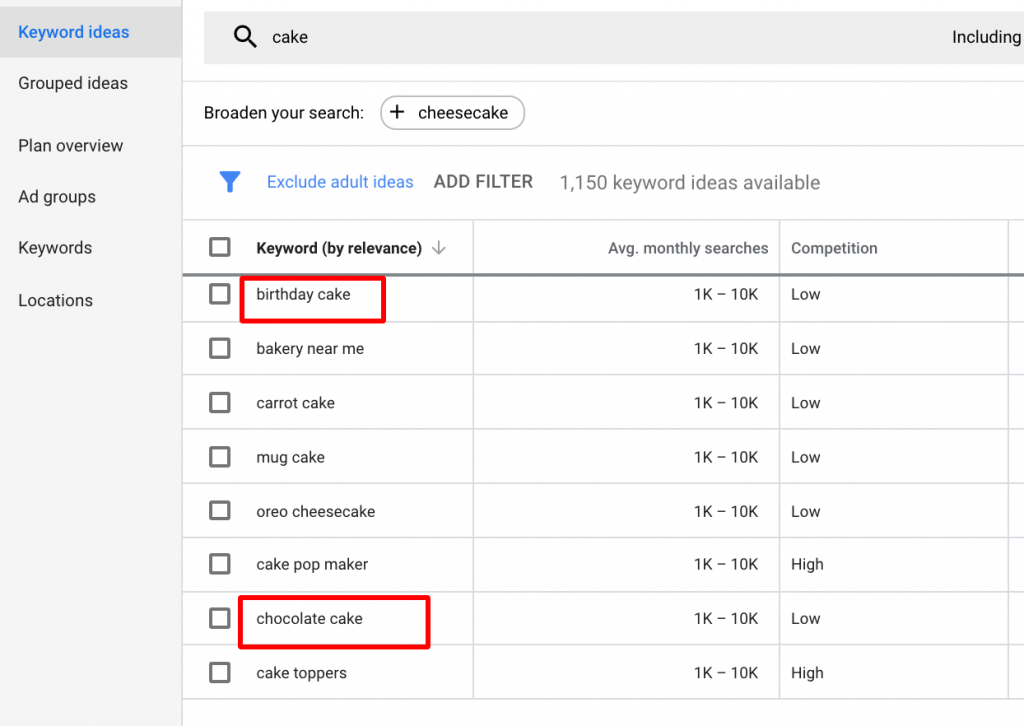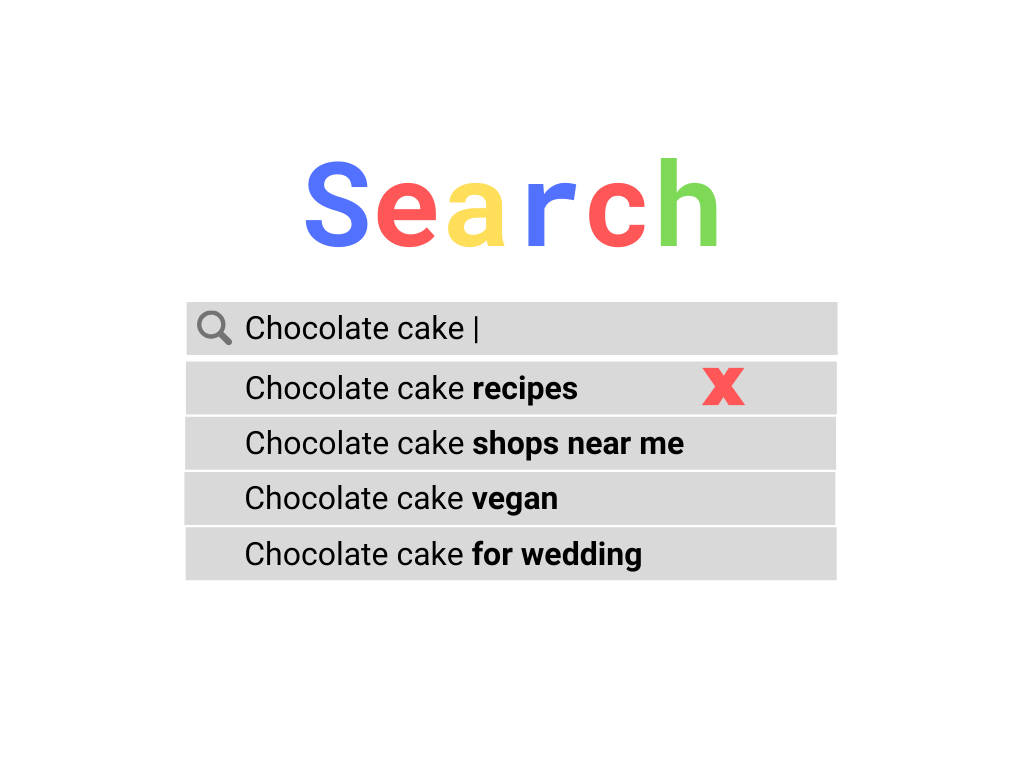When creating a Google Ads campaign, it goes without saying that you need to really carefully consider your campaign’s keyword list.
But did you know that using negative keywords is equally effective, if not more? Negative keywords allow you to highlight terms you want to exclude from your ad, making sure your website doesn’t appear when searchers browse for associated information.
So what is a negative keyword and how can they benefit your ad? Let’s say you own an independent bakery and begin creating your first Google Ad campaign. A common mistake that business’ make is:
- Bidding on obvious or very popular keywords like ‘Cake’
- A user is looking for cake recipes, and so searches for ‘homemade cake recipe’
- Your cake shop ad appears, alongside a range of cake recipes
- The user clicks on your ad, using your budget, without any intention of buying from you.
This search marketing feature focuses on keywords related to intent, but not the kind you want people to use when searching for your link. Instead, you need to think about how to exclude your ad.
What are Negative Keywords?
Let’s delve into this: what are negative keywords and why are they important? Negative keywords allow you to create a list of trigger words and phrases which you don’t want to be associated with your website when users search for them.
You start by selecting a specific negative keyword or phrase and then assigning a matching type to this. The following can be used as a guide when applying negative keywords AdWords to your Google ad:
- Apply [Brackets] for an exact match
- Apply “quotations” for phrases
- Entering keywords without any additional symbols for broad match
- Apply +plus symbol for broad match modifier
By using a combination of these formulas you can create a highly-effective marketing method for your Google Ad. Negative keyword AdWords can make a huge difference in budget terms for your ad, so make sure to choose strategically and effectively!
Different Types of Keywords in Google Ad

Choosing high-quality, relevant keywords will increase the number of valid views on your Google ad. When someone browses Google, you really need to think about their intent: after all, you don’t want your ad to show up for just anyone, or it will destroy your budget!
So you need to choose from a variety of keywords to improve your performance, as well as lower your costs. We here at ClickCease recommend including a healthy mixture of the following different types of keywords:
Negative keywords
Applying negative keywords can help you avoid unnecessary costs as a result of accidental clicks. Rather than creating a list of keywords relevant to your ad, you choose irrelevant keywords that you want to exclude. Meaning that, if your Google ad is promoting a “new, elegant ring” from your jewellery collection, then you won’t appear for searches in “kids swimming rubber ring” – because these aren’t the same type of product.
Regular keywords
How are negative keywords different from other keywords? All ad campaigns need to use high-quality, relevant keywords to reach their target audience effectively. By choosing a list of keywords and phrases which represent your ad, users will be much more likely to click through and buy – and therefore, you save your budget. Selecting keywords that actually describe your ad and product targets quality traffic. You might also want to think about a creative bidding strategy for your campaign.
Negative keywords have two different types, Campaign-Level and Ad-Group.
Campaign level keywords
Campaigns are more general and focus on a single phrase you wish to exclude from your ad. For example, with the bakery example, if you removed ‘cake recipes’ from your search, it would be classed as one campaign – minus that keyword. You’ll probably have several campaigns running at once, but each campaign will only include a single negative campaign-level keyword.
Ad Group keywords
On the other hand, Ad groups focus on more specific keywords you don’t want to show up for. So for your independent baker ad, you could include a negative list of:
- Chocolate cake recipes
- Banana Bread Cake
- Homemade sponge cake
You can add as many ad group keywords as you wish as an effective way of avoiding irrelevant clicks and keeping down your costs.
How to Create Your Own Negative Keywords List
Here’s a quick overview for creating your own negative keywords list.
Firstly, remember that keywords should always align with your business goals. Create a strategy to outline the purpose of your ad, your target audience, and all intentions. When you understand what your ad is all about, you can then accurately choose the searches you don’t want to show up for. Negative keywords can help advertisers better target their ads by only attracting a genuine, relevant interest to their link, with a high likelihood of converters to buyers.
To get started, find a list of negative keywords that every campaign should include online. You can then add your own personalized keywords which are most relevant (or should we say, irrelevant) to your campaign. Make sure to keep an eye out for any keywords that could work well for your Google ad, and make a note of those for your regular, non-negative keywords AdWords campaign.
To optimize your ad fully, you should take some time to analyze your current and past searches for your ad. Check out the search terms report, and you’ll be able to identify which keywords people search to find your campaign, then look at which keywords are converting and which aren’t. By picking up on which phrases aren’t a success, you have more of an idea of what to add to your negative keyword list.
Let’s Wrap it Up!
Bidding on a mixture of both regular and negative keywords can make all the difference for the success of your Google and, both in terms of performance and budget-saving. However, our absolute top tip is that you should spend time analyzing your business goals and outlining your target audience before setting up your campaign. When done right, AdWords’ negative keywords can save you thousands by avoiding unnecessary, budget-wasting clicks.
Like any good thing, there’s always a downside: successful PPC campaigns and its popularity among marketers means there’s a growing risk of fraudulent activity: fraudsters have been known to exhaust a link, clicking time and time again to destroy an ad’s budget, which also results in invalid information when analyzing an ad’s campaign.
Be smart: avoid PPC click fraud by signing up for ClickCease. Check out this link to see our features and pricing, and make the most of your AdWords campaigns: Click here for your ClickCease Free Trial!
